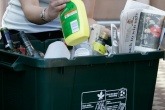Wales needs to ‘step up’ on plastic pollution, says committee
Welsh Assembly Members have called for the government to take swift action on plastic pollution, including banning wet wipes and introducing a deposit return scheme for drinks containers.
The Welsh National Assembly’s Climate Change, Environment and Rural Affairs Committee, set up to scrutinise Welsh Government action on environmental policy, has published a report looking into the effects of plastic waste and pollution.

The report commends action already taken by the Welsh Government, noting that at 62.7 per cent, the Welsh recycling rate remains the third highest in the world and well ahead of its UK neighbours – spurred on by the government’s waste strategy, ‘Towards Zero Waste’, which sets out a statutory recycling target of 70 per cent by 2024/25.
Read more: Wales - leading the recycling world?
The Welsh Government was also the first national government in the world to declare a ‘Climate Emergency’ back in April, ahead of the Scottish and UK governments, in recognition of the urgency of the climate crisis. In fact, on Tuesday (11 June), the Welsh Government also committed to achieving net-zero carbon emissions by 2050, going even further than the recommendations of the UK Committee on Climate Change, which called on Wales to achieve a 95 per cent reduction in greenhouse gas emissions by that point.
However, Chair Mike Hedges AM writes, when it comes to plastic pollution, the committee is ultimately ‘disappointed that the Welsh Government is not getting to grips with the scale of the problem.’
Microplastic pollution
A large section of the report focuses on the impacts of microplastics on the Welsh environment. While there is now evidence that microplastics (pieces of plastic smaller than five millimetres in diameter) are widespread across the food chain, finding their way from land into the rivers and oceans, where they are consumed by marine wildlife, the committee recognises large knowledge gaps in how microplastics reach Welsh waters, where they come from and how exactly they might be impacting human health.
A spokesperson from Natural Resources Wales told the committee: “‘Source control’ options should be sought first to remove the entry of microplastics into the aquatic environment before resorting to ‘end of pipe’ treatment solutions.”

Direct interventions that should be considered, the committee says, include potential restrictions on certain polluting products, such as non-biodegradable wet wipes, which are usually made from a mix of synthetic cellulose and plastic fibres. When flushed, these wipes cause blockages in sewers – more than 2,000 a month, according to Steve Wilson of Dwr Cymru Welsh Water – and can release plastic particles into the wastewater system.
Supporting UK-wide strategy
The UK Government has been consulting, in partnership with the devolved governments, on a range of policy measures to address how waste is collected and increase the amount of waste sent for recycling. The Welsh Assembly report supports the introduction of many of these measures, including an extended producer responsibility (EPR) regime for packaging, which would see producers pay 100 per cent of the costs of collecting and managing their waste – currently, local authorities shoulder around 90 per cent of those costs.
The committee also calls on the Welsh Government to explore how EPR might apply to the clothing industry, with the aim of reducing the level of synthetic microfibres released through washing.
Another measure being considered is the introduction of a deposit return scheme (DRS), which would see consumers pay extra fees on certain products which could be recouped by returning the packaging for recycling. The committee is keen for a DRS in Wales to have as wide a scope as possible – an ‘all in’ scheme with no restrictions on the type of container that is eligible. Were a UK-wide scheme to be restricted to only ‘on the go’ items, those commonly consumed whilst out of the house, then Wales should look to set up its own ‘all in’ scheme separate to the rest of the UK.
Crucial next steps
The Welsh Government has been actively investing in a circular economy for Wales, where natural resources are kept in use through reuse and recycling for as long as possible. On 29 April, the government launched its £6.5-million Circular Economy Fund, which offers grants of between £25,000 and £750,000 to companies looking to boost their use of recycled materials in manufacturing.
This follows £7.5 million of funding announced in February 2018 to help councils boost their recycling rates, and a further £5.4 million in November 2018 for local authority reuse and recycling projects.
While the Welsh Government has been praised for its commitment to increasing recycling rates and building a circular economy, the committee stresses the need for a wider strategic approach to tackling plastic pollution, focused around waste prevention, not simply recycling. Gill Bell of the Marine Conservation Society told the committee: “We’re very proud of our recycling rates, and, indeed, we should be, and we should continue to pursue that, but there has been a focus on the recycling. We need to change that, we need to start looking at extended producer responsibility, to looking at the polluter-pays principle, as well as the preventative principle.”
As such, the committee is calling on the Welsh Government to prepare a 10-year strategy to reduce plastic pollution, which should be developed in partnership with stakeholders and include clear targets and milestones. The committee states: ‘We agree with stakeholders that policies to reduce plastic pollution should prioritise reduction, then reuse, with recycling as a last resort if these cannot be achieved.’
The full ‘Report on policies and proposals relating to plastic pollution and packaging waste’ can be read on the Welsh Assembly website.








